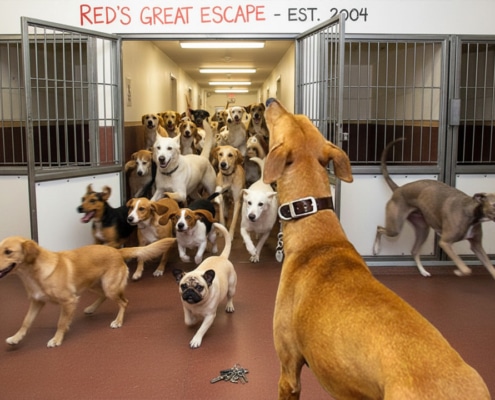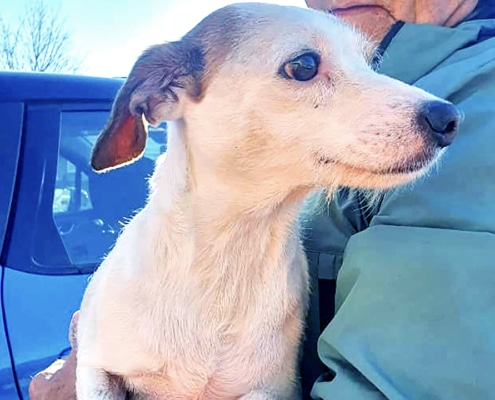The dogs that protect African wildlife
In our cloistered little world, we probably don’t give much thought to the wildlife inhabiting our planet, particularly big game such as elephants, lions, hippos and suchlike. Let’s be honest: unless your home is in a country where these magnificent animals live, it’s a case of out of sight and out of mind, and because we are not involved with protecting these animals, we give little thought to the threat to their survival. Well, maybe we need to give this situation more consideration because unless we all get involved in some way, the wild animals we take for granted will eventually become extinct.
Elephants are still hunted for their tusks despite a ban on the sale of ivory. Zebras are hunted for their unique skins, and the Rhinoceros is still hunted for its horn despite the indisputable evidence that this consumption has absolutely no benefits. The loss of some of our iconic animals is occurring at industrial levels, but the poachers and the smugglers are increasingly facing the one enemy that they cannot fool. “The Dogs.”
Of course, some governments are doing their best to confront this problem, and they are helped by private individuals who passionately care about wildlife.
Without a doubt, the use of highly trained canines is invaluable to the protection of wild animals AND the discovery of trafficked animals and their body parts.
Around the world
A small example of the effectiveness of a dog that led to criminals being apprehended occurred in Tanzania, where a ranger spotted footprints in an area that is usually uninhabited. The dogs were called for and followed the tracks to a line of shares designed to trap wild animals. The canines went even further, and a poacher camp was discovered. Finally, they led the team to the main perpetrators’ home, where bush meat was found. Enough evidence for a prosecution, difficult to deny. All were arrested, but just as important is that this sent a message to the rest of the village.
In Namibia, a huge problem was cheetahs killing livestock, bringing them into conflict with farmers, but a highly unusual solution has been found. The Anatolian Shepherd Dog is a giant breed originating in Turkey and bred specifically to protect said livestock. The important characteristic that is almost unique to this particular breed is that it can be left alone to protect the herd or flock. Surveys showed that the programme is highly successful, with a positive reaction from farmers of over 90%. Some gave a negative review, but unfortunately, it became apparent very quickly that in most instances, their general animal husbandry was lacking as, unsurprisingly, their dogs were reported to be in poor condition.
The African Wildlife Foundation instituted the Canine for Conservation Programme, which trains dogs to recognise ivory and other wildlife products.
In less than a year after their introduction in 2016 the canine unit at Jomo Kenyatta International Airport had already exposed 27 attempts to smuggle animal and animal parts. An unheard of number of finds before the dogs arrived. One such incident was the interception of 500 kilos of Pangolin scales sent from Conakry, Guinea destined for Laos Asia.
At the same time, 18 pieces of raw ivory worth USD 63,000 were discovered en route between Maputo, Mozambique, and Bangkok.
A similar discovery was made when the dogs were directed to inspect a package sent from Kinshasa to Bangkok.
With a success rate of around 90%, the Canine for Conservation is an absolute triumph.
Looking to the future
Sadly, until we can educate everyone at an early age and until the punishment is commensurate with the hideous nature of these crimes, poaching and smuggling will continue.
Africa’s black rhinoceros is now considered extinct, and the only evidence that they existed is photographs. Even Zoos and conservationists were not able to save them. Our descendants will only be able to stare at pictures of species that are around today in the same way that we now look at images of animals past.
If it continues, the destruction of wildlife in Africa will have severe consequences for many countries. Their economies will come under pressure as wildlife tourism, which attracts millions of visitors every year, ends. Unemployment will dramatically increase as these countries’ GDP suffers, with the inevitable consequence of raised taxes, which can lead to the downfall of elected governments.
There is a saying that says, “It’s never too late,” but for many species, it IS already too late, and unfortunately for many others, extinction is on the horizon.
It has occurred to me that despite all technological advances and our continued efforts to send men to the moon, we still have to rely on our best friend to save other animals from extinction. Perhaps the moon’s advantage is that it is uninhabited, so we cannot be responsible for exterminating any more species. Can we?
“One well trained dog can cover as much ground at night as eight officers, making it much harder for the wildlife criminals to evade detection. There is no escaping these dogs.”
Daryll Pleasants
Animals saving Animals






